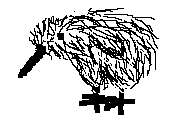

 Home decorating is a third
profession. Many itzu will live somewhere, and that somewhere will
beg to be decorated. That decoration will be entirely a subject of
fashion.
Home decorating is a third
profession. Many itzu will live somewhere, and that somewhere will
beg to be decorated. That decoration will be entirely a subject of
fashion.

The word "Itzu", I hear, is Japanese for either "one and the same" or "pain in the stomache", depending on how you pronounce it.
Back when I believed that my catalytic perpetual motion machine would work, and I was very into nanotechnology, I started hammering out what the distant future might actually be like. I had some ideas of what changes would happen, but what is implied by the changes? How would they interact? This is what I came up with.


 Home decorating is a third
profession. Many itzu will live somewhere, and that somewhere will
beg to be decorated. That decoration will be entirely a subject of
fashion.
Home decorating is a third
profession. Many itzu will live somewhere, and that somewhere will
beg to be decorated. That decoration will be entirely a subject of
fashion.

That is the general shape of the itzu universe.
Next I tried building a single city, its inhabitants, its transportation network, its culture, the games its itzu play, and so forth.
The city is Reef, it is based on a red coral reef and New York, New York. It would be about a kilometer cube. The basic shape would be like a diatom, a hollow sphere with spikes radiating out in all directions. No air; vacuum. For transportation, the spikes would have tubes which the itzu would fly through. How would they fly with no air? Some sort of magnetic propogation. Open question.
There is a game called Earth. It is played with a very large ball
in a slightly larger chamber, with two teams of itzu. The goal is to
get all of your team on the ball, and all of the other team off.
Remember that there is no gravity.

There is another game played with a rope which is like volleyball. Your team keeps the rope from hitting your side of the court, and you're not allowed to cross to the other team's side of the court. I imagine the court being shaped like the inside of a peanut shell.
Even with all this background, I can't imagine what life would be
like for an itzu, so the story stops here.
People talk about aliens invading. There's even an insurance company in England that sells Alien Impregnancy Insurance. What do you think would happen if a traveller hit our solar system? Would we see giant UFOs hovering in the sky, threatening to blow us up? And could we fight it off with jets and atomic bombs?
First he'd set up defenses so that no other traveller could invade his solar system. Next he'd probably make a bunch of backup copies of himself to make sure he doesn't accidentally get wiped out. Then he'd take an inventory of what was his, and find us. (Actually he'd know about us long before he arrived in the solar system, from our radio broadcasts.)
How would we first learn there was an alien? He's only a meter cubed or smaller, so we wouldn't see him in space. Would he land on earth? What for? If he's only interested in mining matter, we'd probably first notice that the asteroid belt was dissolving.
If the alien is interested in Earth life, he'd send a copy of himself down to earth. What would he look like? He'd hide, like a birdwatcher. Maybe he'd look like a rock. Or a bird. Or an ant colony. Or maybe bacteria, and he'd infect everyone and everything. To detect such an alien, impulsively knock something small in your home into liquid helium, then examine strips of it with an atomic force microscope. That might catch him before his probes self-destruct. Maybe. You'd probably notice the alien first because of the asteroid belt dissolving.
(At first I thought gravity wells were a problem, but I was reading Neal Stephenson's "Diamond Age" and it appears they aren't. Nanotech makes it easy to build things lighter than air (you put a vacuum inside), so going between space and a planet's surface isn't really a problem as long as the planet has an atmosphere.)
Suppose the alien wants to teach things to the humans. He could pretend to be a human, or plant the ideas in people's heads. He could appear as a little green man with tentacles. He could come down from the sky like a human with wings in a dazzling white toga, and a glowing gold ring over his head. Whatever.
Suppose we learned this alien was there, and we wanted to get him off our planet or out of our solar system. What could we do about it? Nothing. Remember the backups he made of himself out around Pluto? We could vaporize the whole planet Earth and still not affect him. Our only hope would be to develop nanotechnology first so we can meet the travellers on their own level.
The best guesses are that we will reach nanotechnology in ten to twenty years, and nanotechnology will reach this level of maturity within a few hundred years. If the aliens aren't here already, the chances of them showing up before we're ready for them are awfully slim.
Now isn't that a reassuring thought.
Pentagons that tile the plane
Why there aren't any perpetual
motion machines
Computing the HOMFLY knot polynomial
Dirigiped design page
Table of Contents